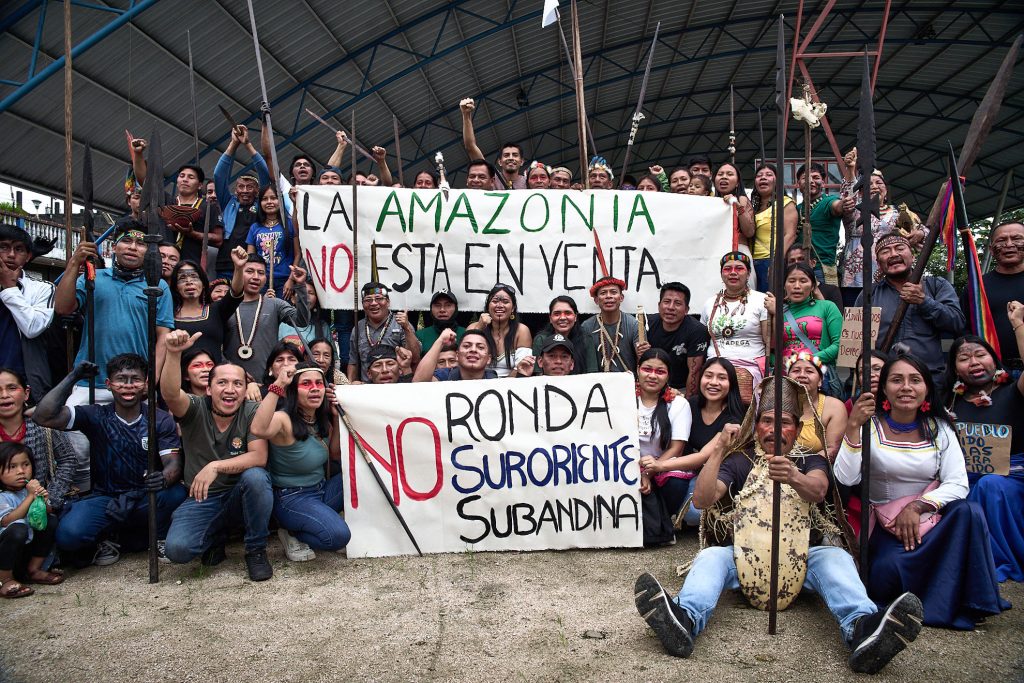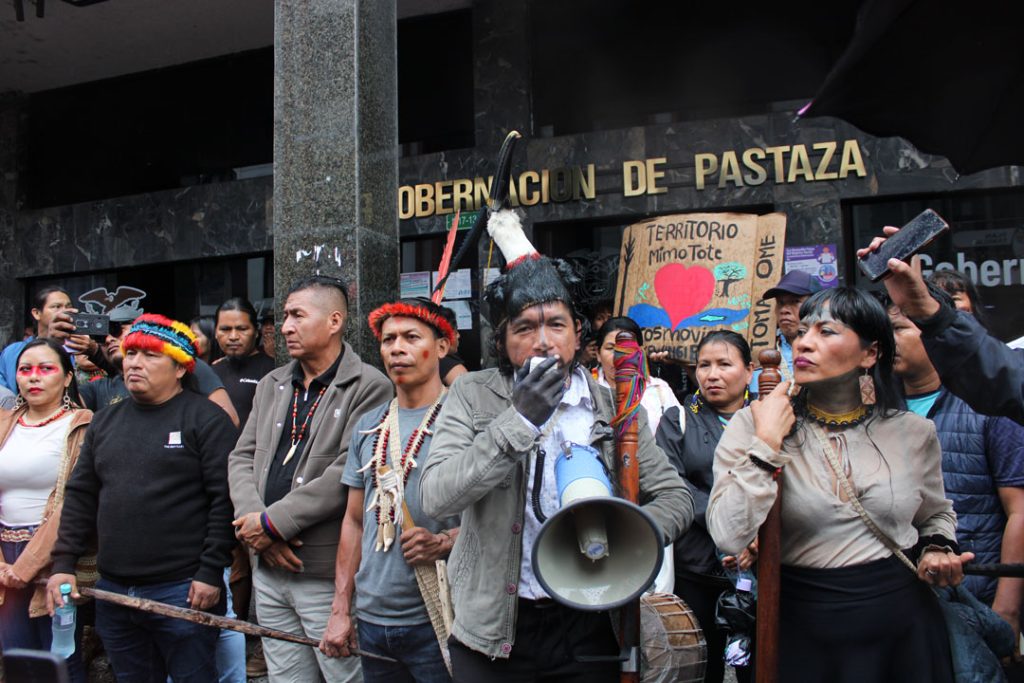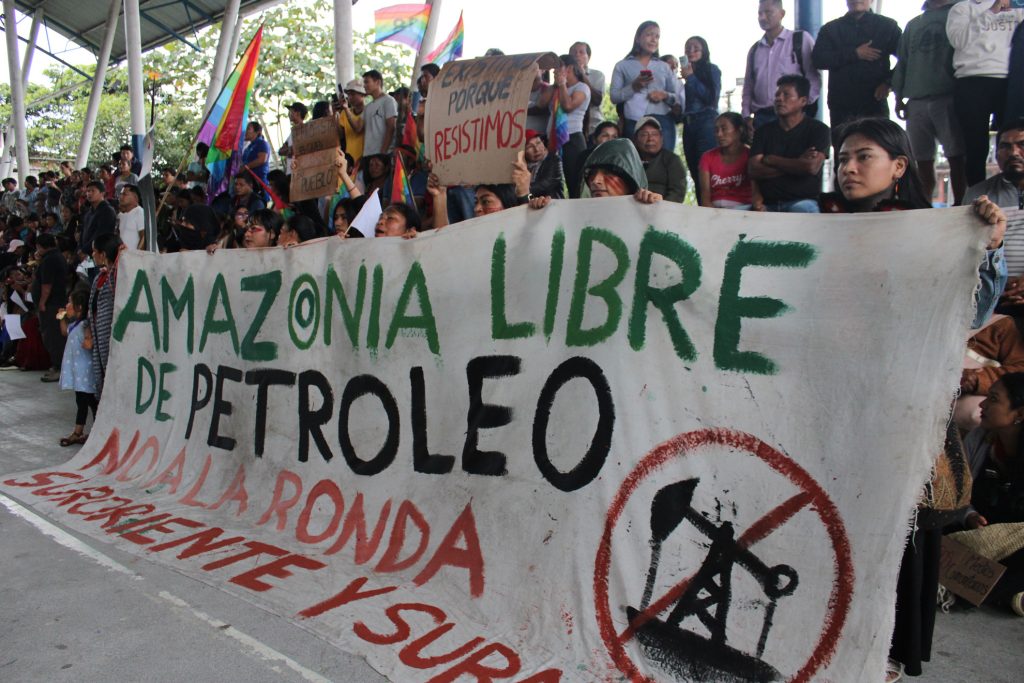Below is the full text of the statement issued by the Waorani Nation of Ecuador (NAWE), the Waorani Organization of Pastaza (OWAP), the Kichwa People of Pastaza (PAKKIRU), Alianza Ceibo, and the Union of People Affected by Chevron-Texaco (UDAPT).



Letter to IMF Chief Kristalina Georgieva Warns Bank Account Freezes and Civil Society Crackdown Signal Investment Risk in Ecuador
WASHINGTON DC, 17 October 2025.— Indigenous organizations in Ecuador delivered an open letter today to International Monetary Fund Managing Director Kristalina Georgieva, directly challenging the financial institution’s promotion of oil and mining expansion in the Amazon and accusing the Ecuadorian government of freezing their bank accounts to silence resistance to extraction. “They had to freeze our money before they could open our lands,” states the letter, released as the IMF holds its Annual Meetings in Washington DC.
The letter, signed by the Waorani Nation of Ecuador (NAWE), the Waorani organization of Pastaza (OWAP), the Kichwa People of Pastaza (PAKKIRU), Alianza Ceibo, and the Union of People Affected by Chevron-Texaco (UDAPT), warns that “a government desperate enough to financially erase us to attract oil investment is a government that cannot guarantee investor security.” The Indigenous leaders cite their 20-year track record of successfully blocking extraction, including court victories in 2012 and 2019, mass mobilizations in 2022, and the 2023 Yasuní referendum, as evidence that IMF-backed extractive expansion cannot succeed without systematic repression.
The letter, issued during the IMF fall meetings, comes as nationwide protests against President Daniel Noboa’s IMF-aligned policies enter their fourth week. The government has responded with heavy police and military repression, leaving at least one dead, over 282 injured, and over 170 arrested. Thirteen Indigenous and human rights defenders face terrorism charges. In late September and early October, the government froze bank accounts of prominent Indigenous leaders and organizations without warning, charges, or legal justification, including CONAIE leader Marlon Vargas, former CONAIE leader and ex-presidential candidate Leonidas Iza Salazar, CONFENAIE President Shiashia José Esach, Pachamama Foundation’s María Belén Páez, the Indigenous and Peasant Movement of Cotopaxi (MICC), and Alianza Ceibo. The account freezes came two months after the government announced new oil licensing rounds in Indigenous territories.
The IMF’s July 2025 Second Review explicitly promotes “high potential sectors such as mining, hydrocarbons, and energy,” requiring Ecuador to reopen its mining cadaster (closed since 2018), develop a new fiscal regime for mining, and implement an “ambitious multi-year plan to mobilize investments in the hydrocarbon sector.” These are formal structural benchmarks Ecuador must meet to continue receiving loan disbursements, with deadlines in December 2025 and June 2026. The same IMF program required elimination of diesel subsidies, causing prices to spike 56% from $1.80 to $2.80 per gallon last month. For Indigenous communities dependent on diesel-powered canoes to navigate remote Amazon rivers, this policy made basic survival more expensive precisely as the government prepared to expand oil extraction in their territories.
In August 2025, the Noboa government announced the “Ronda suroriente y subandina”, a massive new oil licensing round comprising nearly 50 projects across 8.7 million acres of pristine Amazon rainforest. The announcement came shortly before the wave of bank account freezes targeting Indigenous organizations that have historically defended these territories. Six new large-scale mines are also expected to come online over the next five years, tripling current mining operations.
“Indigenous peoples are clear: no matter how much they block the bank accounts of our organizations, we will never give consent for oil activities on our lands,” said Juan Bay, President of the Waorani Nation of Ecuador. “If the government tries to force extractive policies on our territories, it will find only struggle and resistance.”
“As Indigenous Peoples, we have the right to decide what happens in our territories,” said Nemonte Nenquimo, co-founder of Alianza Ceibo and Amazon Frontlines. “We will not allow governments, oil executives or financial institutions to impose their short-sighted agenda on us, and destroy our sacred millennial forests to extract some of the country’s last drops of oil. The Amazon Rainforest gives us life and keeps our climate in balance: instead of shutting down our bank accounts and persecuting us, they should be backing us, listening to us and investing in the solutions we are putting forward.”
The open letter reframes the account freezes not just as human rights violations but as a warning to investors. “When a government freezes civil Indigenous peoples bank accounts without due process, it shows the same arbitrary power it will use against investors when contracts become inconvenient,” the letter states. Indigenous leaders point out that they “still control the land they want to drill” and maintain constitutional rights, international solidarity, and determination to resist. “Every dollar they put into our territories will meet centuries and collective wisdom of indigenous resistance. They froze us because we are winning. And we will continue to defend our home with or without bank accounts.”
This is the third national mobilization in six years against IMF-backed policies. In 2019 and 2022, the Indigenous movement successfully forced governments to back down from IMF loan deals. In August 2023, Ecuadorians voted by national referendum to keep oil in the ground in Yasuní National Park. The crisis occurs as Ecuador faces a November 2025 referendum that could dismantle protections in the 2008 Constitution, including Indigenous peoples’ right to Free, Prior and Informed Consent for extractive projects affecting their territories.
“Our home is under constant threat. In the name of “development,” we cannot favor some while condemning others to suffering: the lives of Indigenous Peoples, and of the visible and invisible beings, the spiritual beings who inhabit the Kawsak Sacha, the Living Forest”, said Luis Canelos, Kichwa leader and President of PAKKIRU. “The extractive policies implemented by the Noboa government to comply with the agreements made with the IMF are causing great harm to our ways of life and to the territories we have lived in and cared for over centuries. We make an urgent call to the international community: stop using fossil fuels extracted from the Ecuadorian Amazon and stop financing exploitation, looting, dispossession, and death caused by multinational corporations extracting oil from territories that are both culturally and ecologically diverse.”
The Indigenous organizations are calling on the IMF to publicly respond to the concerns raised in the open letter, reconsider structural benchmarks that promote extractive industries in Indigenous territories, assess human rights impacts of its loan conditions, and acknowledge the connection between its policies and financial repression of civil society. “Dear Ms. Georgieva, think twice before supporting the measures from the Ecuadorian government,” the letter concludes. “The Ecuadorian peoples will hold you accountable, too.”
The full letter is attached and also available here.
CONTACTS: For interviews, please contact Luisana Aguilar, Amazon Frontlines National Press Coordinator (+593 99 924 0129), email: luisana@amazonfrontlines.org . Or contact directly to the following emails: Waorani Nation of Ecuador (NAWE): nawe.comunicacion@gmail.com; Kichwa People of Pastaza (PAKKIRU): Presidencia@pakkiru.org; Waorani Organization of Pastaza (OWAP): owapcomunicacion@gmail.com; Alianza Ceibo: directorio@alianzaceibo.org and Union of People Affected by Chevron-Texaco (UDAPT): udapt1993@gmail.com
ABOUT THE SIGNATORIES: The Waorani Nation of Ecuador (NAWE), Waorani Organization of Pastaza (OWAP), Kichwa People of Pastaza (PAKKIRU), Ceibo Alliance, and Union of People Affected by Chevron-Texaco (UDAPT) represent Indigenous communities in the Ecuadorian Amazon working to defend territorial rights and environmental protection. The following organizations following the IMF fall meetings in Washington DC have endorsed this letter: Recourse, Bretton Woods Project and Fight Inequality Alliance (FIA).
EDITORS NOTE: The IMF was contacted for comment at 10:00am ET Friday October 17, 2025. We will provide updates once we get a response.




